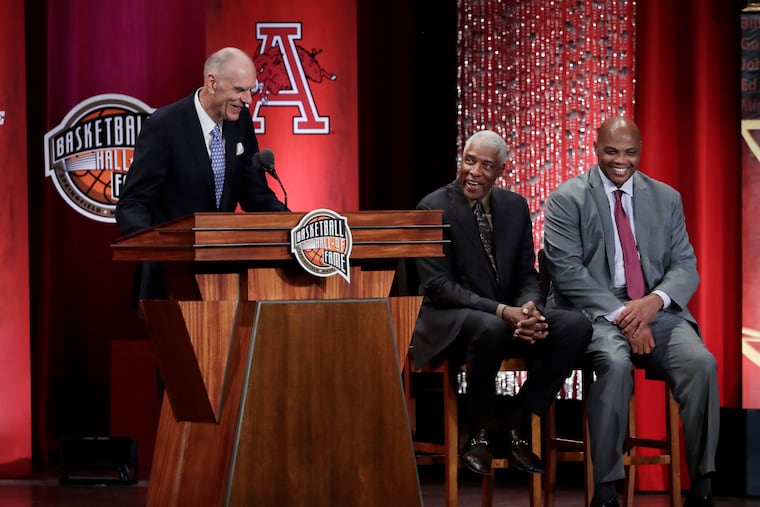Former 76er Bobby Jones enters the basketball Hall of Fame
Racing through the words he read from a teleprompter as if he feared a fine for talking too long, Jones thanked a lifetime of what he termed “encouragers” -- coaches, teammates, family members, even officials.

SPRINGFIELD, Mass. – Wearing a blue suit offset by a sky-blue 76ers tie and a simple white pocket square, plain-old Bobby Jones fast-breaked through his acceptance speech at Friday night’s Hall of Fame Enshrinement Ceremony, in the process revealing more about himself than statistics or the career highlights shown to the Springfield Symphony Hall audience.
It was his talk’s length and not its content that had most concerned Jones. And while others in the Class of 2019 rolled casually past a five-minute time frame, the ex-76ers star, rigidly but earnestly upright throughout his 12-year professional career, made sure he stayed within the limit.
“I’m a rules follower. It’s going to be five minutes,” Jones had predicted matter-of-factly a day earlier.
He finished with time to spare, in just 4 minutes, 25 seconds.
Jones, 67, was supposed to have been presented by Denver teammate David Thompson and his Philadelphia coach, Billy Cunningham, a 1986 inductee who was one of the many “encouragers” he thanked.
But Thompson was ill, and Cunningham was stranded in North Carolina by Hurricane Dorian, so Jones had Philadelphia teammates Julius Erving and Charles Barkley accompany him to the stage.
“I’d like to thank them for coming off the bench,” joked Jones, the first winner of the NBA’s sixth-man award. “It’s not a bad gig, is it?”
Cunningham did play a role, however, in a story Jones told beforehand, one that further validated the character of the eight-time all-NBA defender who has spent much of his post-basketball life in Christian ministries.
During a game at the Spectrum, a ball caromed out of bounds from a multiplayer scrum. The official, who was screened, asked the 76ers forward if the ball had touched him last.
“I told him it had. Then I ran as fast as I could down court because I knew Billy wouldn’t be happy,” Jones said. “As I’m running, I can hear Billy stomping his feet and screaming, `Bobby, that’s his job. Let him make the call.’
“Over the years, Billy was always one of those guys who was pulling for me. Twenty years ago, he was telling me, `You should be in the Hall of Fame.’ ”
Racing through the words he read from a teleprompter as if he feared a fine for talking too long, Jones thanked a lifetime of what he termed “encouragers” -- coaches, teammates, family members, even officials.
Typically, he touched on only a few personal highlights, among them the meaningful conversations that, on bus rides back from Washington, he engaged in with teammates, and his surprising selection to the 1972 U.S. Olympic team.
“One of my proudest moments was when I called my dad from Colorado Springs to tell him I’d made the Olympic team,” Jones said. “There was silence on the phone for about five seconds until he choked out the words, `We’re proud, proud, proud.’”
Jones, too, had to choke out those words in the recollection, producing the lone hesitation in an address that came early in the event held annually in this city where basketball was founded.
Another he cited was Larry Brown, his coach with the ABA’s Nuggets, who once called Jones, “an honest man in a game of liar’s poker.”
In the video presentation that preceded his talk, Cunningham said Jones impacted the game defensively more than any player in league history. And his election, after years of failed attempts, signified a new Hall emphasis on defense.
Defense also ranked at the top of the resumes of two other Class of 2019 members -- two-time NBA defensive player of the year Sidney Moncrief and Teresa Weatherspoon, who won that honor twice in the WNBA.
The others enshrined in the Hall Friday night were Carl Braun, a 1950s Knicks star; Chuck Cooper, the NBA’s first African-American draft pick; Seattle’s Jack Sikma, a shooting center who was a seven-time NBA all-star; Vlade Divac, the Sacramento center who helped initiate the NBA’s flood of international stars; Al Attles, drafted by the Warriors when they were in Philadelphia and still an executive with the team; Celtics coach Bill Fitch; Paul Westphal, a five-time all-star with Phoenix; the Tennessee A&I teams of 1957-59; and Wayland Baptist’s pioneering women’s program.